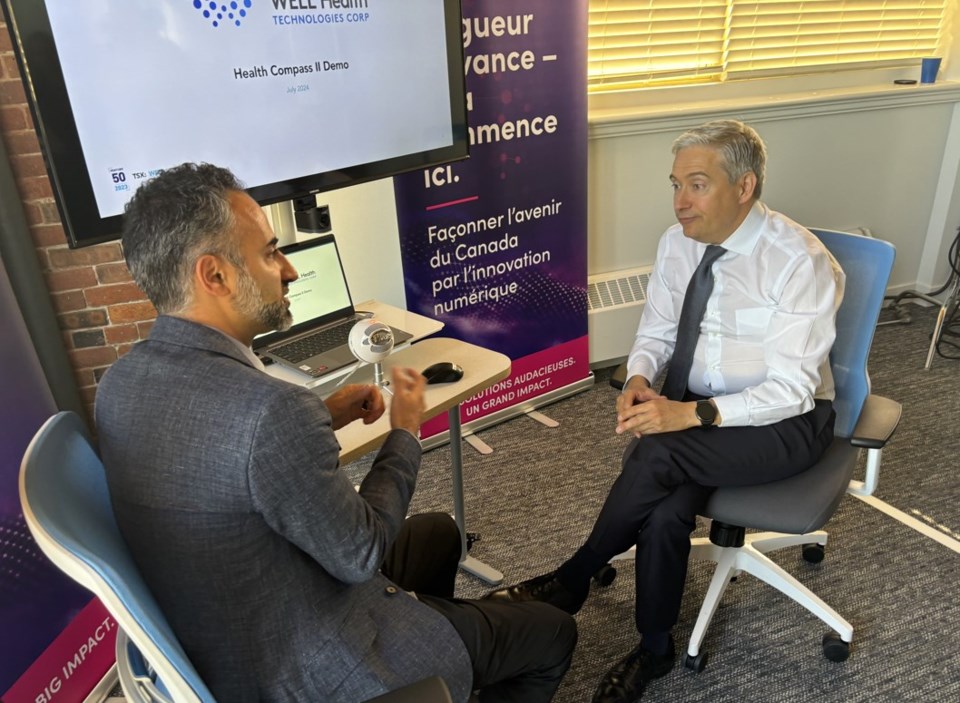Vancouver-based health-care provider and technology developer Well Health Technologies Corp. (TSX:WELL) and partners today nabbed $15.3 million in funding for their $44-million project to develop artificial-intelligence (AI) technology that helps doctors save time.
The money comes from the Vancouver-based organization that distributes federal government capital, now known as Digital: ÎÚÑ»´«Ã½'s Global Innovation Cluster, after a rebranding from being .
Digital has been . Since 2018, it has doled out about $255 million to companies it deems merit funding, including $200 million to support AI-enabled technologies. In May, BIV reported that .
The $15.3 million investment today is the largest of its investments to date, and it is for the $44-million project dubbed Health Compass II. Digital had previously invested in the first phase of the Health Compass project, of which Well Health was a partner.
Consortium partners alongside Well Health include Orx.ai, Healwell AI Inc. (TSX: AIDX) Tali AI, Phelix, and Simon Fraser University.
A rounded-off breakdown of the funding is that Well Health will get $6.8 million, Orx.ai will get $2.5 million, Tali AI will get $2.2 million Phelix will get $1.8 million and Healwell AI will get $1.7 million.
Representatives of those companies were on hand this morning for a press conference and technology demonstration with federal Minister of Innovation, Science and Industry François-Philippe Champagne, among others.
The highlight of the technology demonstration was when Well Health medical director Stephen MacDonald had a five-minute chat with Champagne about what Champagne said was a recent health condition where he had a sore throat and could not swallow easily.
MacDonald clicked a button on a screen and the AI-powered technology transcribed the series of questions he asked Champagne about the condition, as well as Champagne's answers. Once the conversation was done, MacDonald clicked a button on the screen and the transcribed notes converted into a structured summary of what had been said.
The text that the AI technology spat out in that summary also included some assessments of what Champagne's condition could be even though MacDonald had not made the diagnosis. "Likely gastroesophageal reflux disease (GERD)," was one of the statements that the technology generated on the screen, for example.
"We are living at the time of basically a Renaissance in life sciences," Champagne said afterwards in a speech.
"Vancouver now is a global hub for life sciences and bio-manufacturing, and I would say it's in great part to people and what we've done with scale, the digital cluster here, and what we've done with artificial intelligence and obviously with people as well."
Well Health COO Amir Javidan had earlier walked Champagne through other parts of its Health Compass technology that help automate back-office tasks in medical clinics. He also explained how Well Health, separate from its technological side, is also the largest owner-operator of medical clinics in ÎÚÑ»´«Ã½, with more than 175.
Well Health's chief medical officer, Michael Frankel, who is also a practising physician, lauded the technology for its time-saving capacity.
"This would take me a long time to write out and it just comes up automatically," he said of the technology that he uses in his practice.
"It is basically saving each doctor two hours a day so that they can spend more time with their family, or see more patients."
One of Well Health's biggest investors is Chinese billionaire Li Ka-shing, a man likely best known to many Vancouverites as the guy whose company bought the city's former Expo 86 site in 1988 for $320 million, to be spread over 15 years. BIV reported in 2019 that Ka-shing had an almost 11-per-cent stake in the company, while his venture capital firm Horizon Ventures owned a seven-per-cent stake.
Well’s founder and CEO, Hamed Shahbazi is likely best known for founding Tio Networks Corp. before selling it to PayPal Holdings Inc. for $304 million in 2017.

